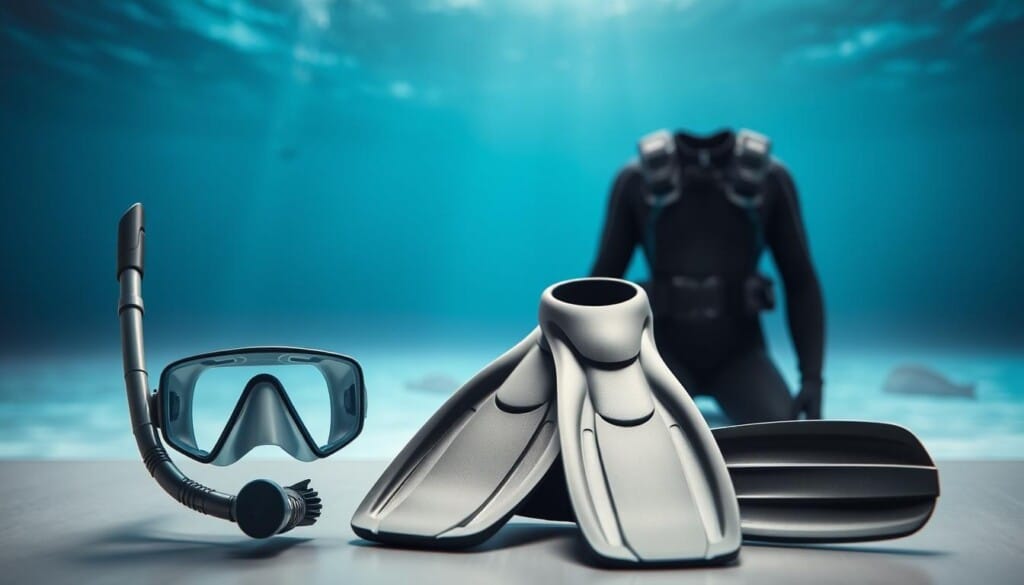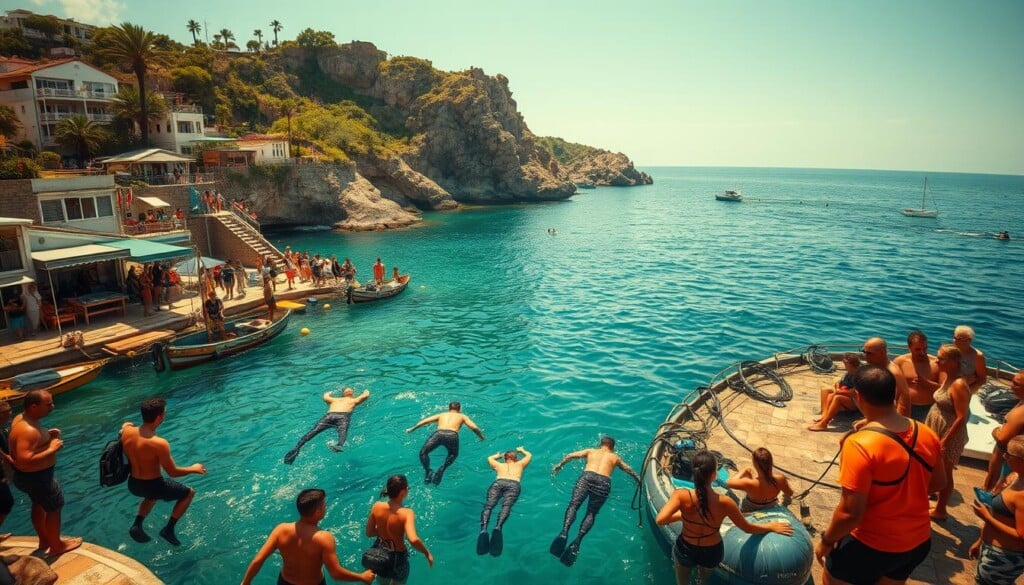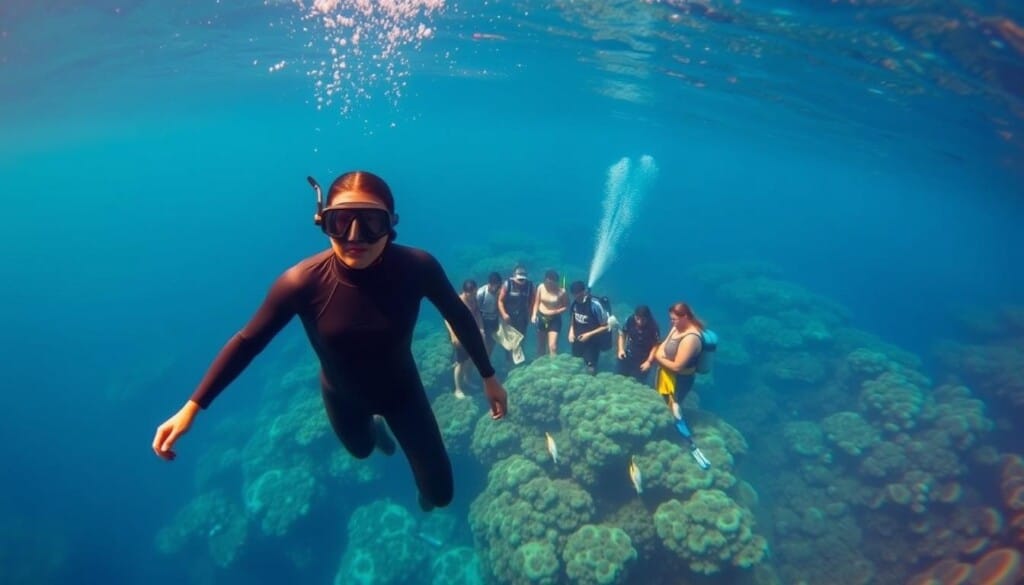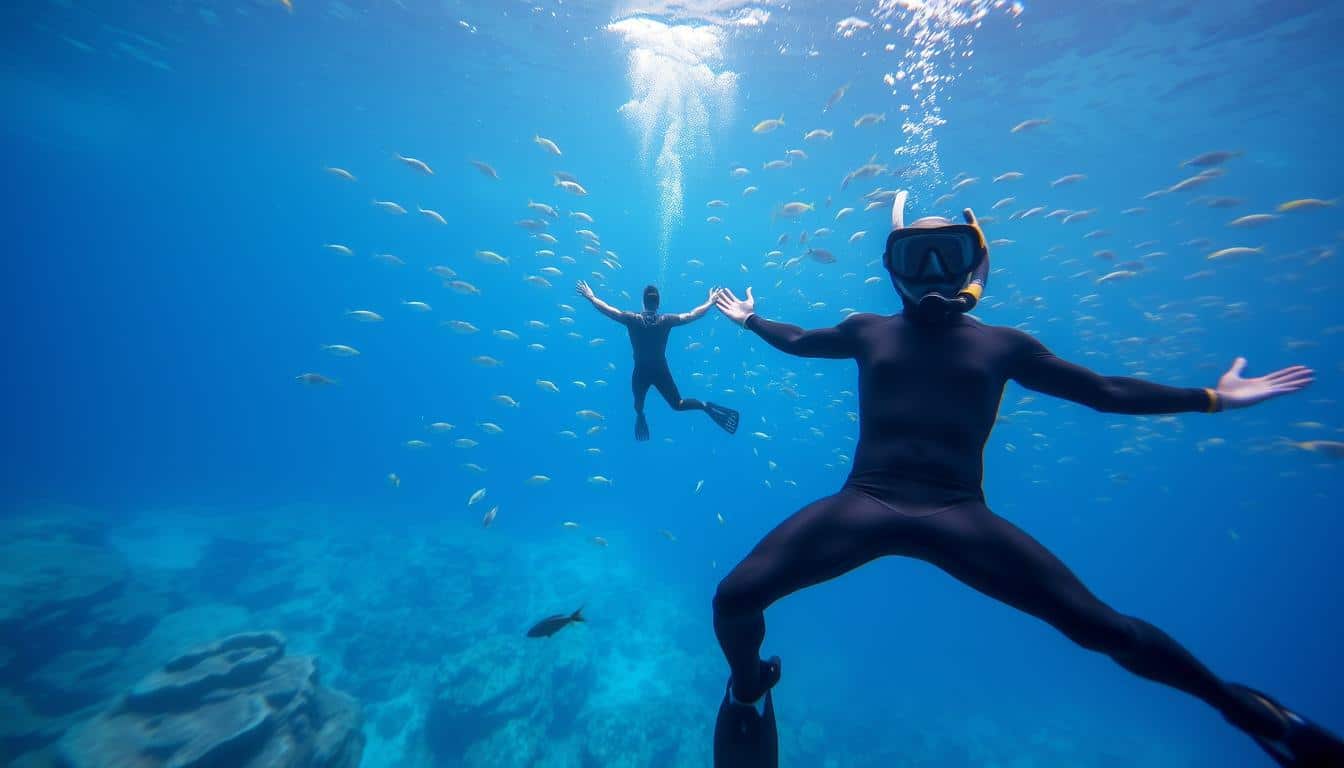Ever thought about how simple diving can open up a whole new world under the sea? Free diving lets you explore the ocean with just a few tools and some breath-holding skills. This article will guide you through the basics of free diving, including the right gear, safety tips, and training resources.
Whether you’re new to diving or have been doing it for years, there’s something here for you. You’ll learn how to dive deeper into the marine world.
Key Takeaways
- Free diving offers a unique approach to underwater exploration with minimal equipment.
- Essential tips and techniques can enhance your underwater experience and safety.
- Understanding the right gear is critical for effective and enjoyable free diving.
- Diver training resources are available to improve your skills and confidence.
- Joining a community can enhance your diving adventures and foster connections.
What is Free Diving?
Free diving, also known as breath-hold diving, lets people dive deep without scuba gear. It includes types like Static Apnea and Dynamic Apnea. Each type offers unique challenges and rewards.
Understanding the Basics of Free Diving
Free diving connects us deeply with the underwater world. It’s about controlling your breath and body. To dive well, you need to prepare and stay in shape, both physically and mentally.
Key Techniques for Beginners
For newbies, learning the basics is key. Start with breathing exercises to improve lung capacity. Static apnea practice boosts confidence.
Good body positioning and fin techniques are also important. They help you dive smoothly and efficiently.
Safety Precautions Every Diver Should Know
Safety is a top priority in free diving. Always dive with a buddy for safety. Knowing the signs of hypoxia is critical to avoid trouble underwater.
Following safety rules and getting proper training is essential. It makes diving safe and fun.
Essential Free Diving Gear
Choosing the right diving gear is key for safety and performance in Free Diving. The right equipment makes diving more comfortable and enjoyable. It also helps you explore the underwater world better.
Choosing the Right Wetsuit
Wetsuits are vital for a good diving experience. They come in different styles, like full suits or shorties. The type you need depends on the water temperature.
A well-fitted wetsuit keeps you warm and comfortable. It’s important for staying warm while diving. Choosing quality equipment helps you stay warm longer, so you can dive for more time.
Masks, Fins, and Snorkels: What You Need
Masks, fins, and snorkels are essential for Free Diving. A low-volume mask helps you see better and saves air. Flexible fins make it easier to move through the water.
A good snorkel also helps. It should be comfortable and reduce drag. Quality equipment in these areas makes diving more comfortable and effective.
Buoyancy Control Devices Explained
Buoyancy control is critical for Free Diving. Weight belts are often needed for deeper dives to stay neutral. Learning to control buoyancy saves energy and improves underwater movement.
Understanding how gear affects buoyancy is key. It makes diving better and is worth investing in the right gear.

Learning Free Diving Skills
Getting good at free diving is key for those who love exploring the deep sea. Taking part in diver training is a must. It lays a strong base and teaches safety, which is very important.
Where to Find Free Diving Classes
Places like SSI, AIDA, and PADI offer great courses for all levels. They teach safety, basic skills, and different certifications. This makes sure you’re ready for your dives.
Online Tutorials and Resources
Online tutorials are perfect for learning at your own speed. You can find videos and articles on free diving. They cover important techniques and safety, helping you learn easily.
Practice Techniques for Improved Performance
Practicing in places like swimming pools helps a lot. You can work on holding your breath and controlling your breathing. This is key for diving well. With practice, you’ll be ready for amazing underwater adventures.
Safety Measures for Free Divers
Safety is key in free diving. Even small mistakes can be dangerous. Knowing basic safety steps can make diving safer and more fun. It’s about building good habits and being ready for anything.
The Importance of Buddy Systems
Diving with a buddy is very important. It means you have help if something goes wrong. You should always see and talk to your buddy. This makes diving safer and more enjoyable.
Signs of Hypoxia and How to Avoid It
Divers need to watch for signs of hypoxia, like feeling dizzy. To avoid this, stick to safe dive times and breathe slowly. Training teaches you to spot and handle these signs early.
Emergency Procedures in Case of Trouble
Every diver should know how to handle emergencies. This includes rescues and first aid. Training helps you deal with different situations. Being prepared makes diving safer for everyone.
Popular Free Diving Locations in the U.S.
Free diving fans have many great places to explore in the United States. These spots have amazing underwater worlds and lots of marine life. Divers of all levels will find the perfect spot for their next adventure.
Top Beaches for Free Diving Adventures
The Florida Keys, Big Sur, and Maui are famous for their beauty and diving conditions. The clear waters make it easy to see what’s below. Divers will love seeing all the different sea creatures.
Hidden Gems: Lesser-Known Dive Spots
Lake Tahoe and inland quarries offer unique diving experiences. These places are less crowded and show off the beauty of the underwater world. Divers can enjoy peace and quiet in these spots.
Seasonal Considerations for Safe Diving
Knowing the seasons is key for safe diving. Weather, water clarity, and sea life changes affect dives. Summer is usually the best time for diving because of the warm weather. Always plan ahead for a safe and fun dive.
The Role of Local Businesses in Free Diving
Local businesses are key in growing the free diving culture. They offer support and services that make diving better. With tools like LocalZ, they help divers find what they need and connect with experts.
How LocalZ Supports Free Diving Communities
LocalZ is an online guide that boosts community ties in free diving. It lists places for diving gear and lessons. This helps divers get the most out of their dives and strengthens the community.
Connecting Divers with Local Experts
Knowing local experts makes diving safer and more fun. LocalZ helps divers find top-notch instructors and gear. This leads to better diving experiences and more confidence in the water.
The Importance of Supporting Local Dive Shops
Local dive shops are essential for diving. They offer equipment and training. Supporting them keeps the diving community strong. They also give personal advice that makes diving safer and more enjoyable.

Benefits of Joining a Free Diving Community
Joining a free diving community brings many benefits. It offers a chance to connect with others who share your passion. You gain access to valuable resources and connections that help you grow both personally and in your diving skills.
Networking Opportunities with Fellow Divers
Being part of a free diving community lets you share knowledge and tips. It creates a supportive network where everyone helps each other. This camaraderie makes learning more enjoyable and helps you improve your diving skills.
Participating in Local Diving Events
Local diving events are great for building friendships and improving your skills. Whether it’s a competition, clean-up dive, or group trip, these events offer unique experiences. They help you connect with the sport on a deeper level.
Sharing Experiences and Knowledge
A strong community encourages sharing stories and insights. This open exchange helps everyone improve their diving techniques. It also inspires others to keep exploring the underwater world.
Getting Involved with LocalZ
LocalZ is a key platform for local businesses and the free diving community. It makes it easy for diving fans to find top-notch local services and advice. This digital tool changes how businesses connect, boosting the economy and community ties.
How LocalZ Revolutionizes Business Connections
LocalZ makes it easy for local businesses to meet diving enthusiasts. It’s a great place for marketing and building community. Businesses get more visibility, reaching people who love diving.
Steps to Join and List Your Free Diving Services
Joining LocalZ is simple. Businesses create a profile and add their free diving services. This helps them connect with local divers and attract new customers.
Why LocalZ is Your Go-To for Local Engagement
LocalZ supports local businesses by giving a part of listing fees to community projects. This shows its commitment to the community. Divers get great services and help the community grow.

Environmental Responsibility and Free Diving
Free diving lets us connect with marine ecosystems in a special way. It shows us the beauty and fragility of marine life. This activity highlights the need for environmental responsibility and sustainable diving.
The Impact of Free Diving on Marine Life
Free divers often become champions for marine conservation. They help raise awareness about the many species in our oceans. By diving responsibly, they help keep marine ecosystems vibrant and healthy for the future.
Practices for Sustainable Diving
It’s key to dive sustainably to keep ecosystems balanced. Divers should avoid disturbing marine life and dispose of waste properly. Following these practices ensures safe diving and protects ocean health.
How You Can Contribute to Ocean Conservation
Everyone can help protect our oceans. Joining beach cleanups, supporting eco-friendly groups, and pushing for sustainable diving are great ways to help. By doing these things, divers can play a big role in saving marine environments.
Conclusion: Dive into the Local Community
Free diving opens up a world of excitement and deep connections. It lets you bond with nature and local communities. By diving into this lifestyle, you form a special connection with the ocean.
This connection teaches you about living sustainably and caring for the environment. As you explore the ocean, you can share your love for diving with others. This builds a strong community that values marine life.
Working with local businesses makes your diving experience better. Supporting dive shops and experts gives you access to top-notch gear. It also strengthens community ties.
These connections help divers learn from each other, making diving safer and more fun. Together, divers and local businesses create a thriving diving culture. They plan events and open up new diving spots.
The future of free diving is bright, thanks to local connections and community spirit. As more people dive, they help local economies and protect the environment. By choosing local services, divers support sustainable practices and help save their favorite underwater places.
Being part of this movement makes your diving experiences richer. It also helps the community and the environment grow stronger.

